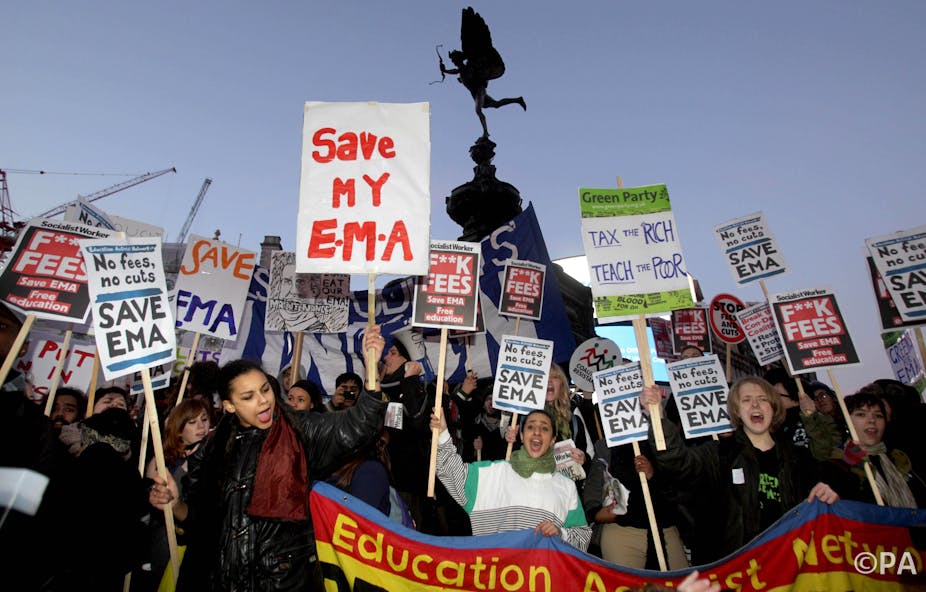Recent proposals for benefit reform have centred upon the argument that at present many people feel they get nothing for something from the welfare state, while those on benefits reap the rewards.
The rationale behind these proposals is two-fold. The first is that the erosion of universal benefits and social insurance means many people feel they now get little welfare bang for their income tax buck. This is the argument for self-interest: people like welfare when they get something from it.
The second is that heavy means-testing has created a dependency culture in which many claimants do not want to work. This is the argument against solidarity: that the public are less willing to help benefit claimants because they perceive them as undeserving.
But what if there is another cause of attitude change? And thus, what if the solution might be much, much different?
Welfare and young people
The graph below shows the percentage change (1987-2011) for those who agree with three long-running questions from the British Social Attitudes series relating to the benefits system. Importantly, the graph is broken down by age-group.

The first conclusion we can draw is that there has been a uniform shift against support for the welfare state.
However, by far the largest shift in negative attitudes was among 18-34 and 35-44 year-olds. Among 18-34 year olds for example, the belief that “unemployment benefits are too high” rose 52.5% between 1987 and 2011. For the over-65s, the corresponding change was just 21.6%.
Of course, age is not the only demographic factor associated with changes in attitudes towards welfare. Labour supporters, for example, have shifted their views much more rapidly than Conservative ones. Similarly, people in Northern England, Scotland and Wales have “caught up” with those in the traditionally more conservative South.
Conservative sympathisers and southerners are still significantly more likely to report negative attitudes than other groups in most instances. Yet being young, which was once a predictor of positive attitudes to the welfare state, is now a fairly strong predictor of negative attitudes. This is a remarkable transformation.
Distinct values
One reason for this change could be that the youngest generation of adults hold culturally distinct values on a whole range of issues: from the economy and civil liberties to welfare and social justice. Young people are supposedly much more individualist than previous generations. So they are less swayed by arguments about the collective pooling of social and economic risks than, say, the baby boomers born after World War II.
Also, young people have been at the receiving end of some of the most high-profile reforms and cuts to the broader system of state provision. The Education Maintenance Allowance – a seemingly popular and effective programme – was abolished, while tuition fees were trebled up to £9000 per year. Now the Conservatives have pledged to abolish Housing Benefit for under-25s if they win the next general election.
These two forces have created a new dynamic where the liberal, more individualistic outlook of younger people is strengthened and reinforced by a weakened stake in welfare provision.
Implications for the welfare state
For people concerned for the legitimacy of the welfare state, changing youth attitudes raises question marks over how welfare can be defended. Evidence suggests that the idea of a contributory principle – where people get back what they put in – is favoured by older and more advantaged groups, so it might do little (if anything) to win over the young. Indeed, shifting even more resources towards established workers – as the contributory principle logically implies – may end up alienating young people even more.
Instead, new policy should ensure much greater protection, support and opportunities for young people. A good start would be to defend the rights of young people to social security benefits, as well as investing much more in supporting the often difficult and complex transition between full-time education and the labour market.
Social security should also resonate with the particular cultural values that young people have: if they are more wedded to notions of personal freedom and autonomy than solidarity, social policies should be designed accordingly. More support could be offered, for example, to young people who want to move to new areas in search of jobs or training opportunities.
The welfare state is not in the extreme state of crisis some politicians would have us believe – support for the broader principles of social security remains strong. But the capacity of the welfare state to tackle poverty and protect against social risks is reliant upon a strong degree of social legitimacy.
Understanding which groups have shifted their support – and why – is essential. For those who want to defend the welfare state, new and relevant ways must be found to make it work for the 21st century.
A version of this article was first published on Society Central, the evidence-for-policymakers site run by the Institute for Social and Economic Research.

